Willie Ross
-Pipe Major, M.B.E.- (1878-1966)
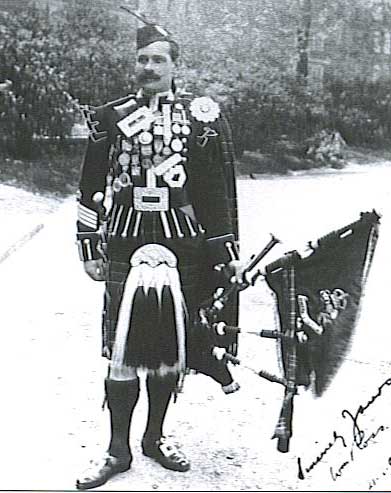
While many who heard them live contend that G. S. McLennan was the finest strathspey and reel player during the early years of the 20th century, John MacColl the best march player, and John MacDonald of Inverness the best piobaireachd player, many see Willie Ross as the best all-round player of the period. He was known for stirring music and a beautifully toned instrument in everything he played, and his prize-winning in the major events set records for both piobaireachd and light music.
With this competitive record, more than 50 years of continuous teaching throughout Scotland, five seminal books of bagpipe music and many popular compositions to his credit, Willie Ross can certainly lay claim to having been the most influential piper of the century, including during the decades after his death.
He was born to piping parents in Glenstrathfarrar near Beauly in Inverness-shire on June 14, 1878, and was taught primarily by his mother, Mary Collie. He turned his sights on the army quickly, joining the Scots Guards at age 18 in 1896, thus beginning an military association that would last for 60 years.
He was decorated with the 1st Battalion in the Boer War in South Africa from 1899-1902. By then he was already composing tunes, among them The Scots Guards’ Farewell to South Africa. In 1905 he became Pipe-Major of the 2nd Battalion, while his younger brother Alexander would become Pipe-Major of the 1st Battalion in 1911. He served in France during the Great War until he was invalided from the service in 1918 due to rheumatism.
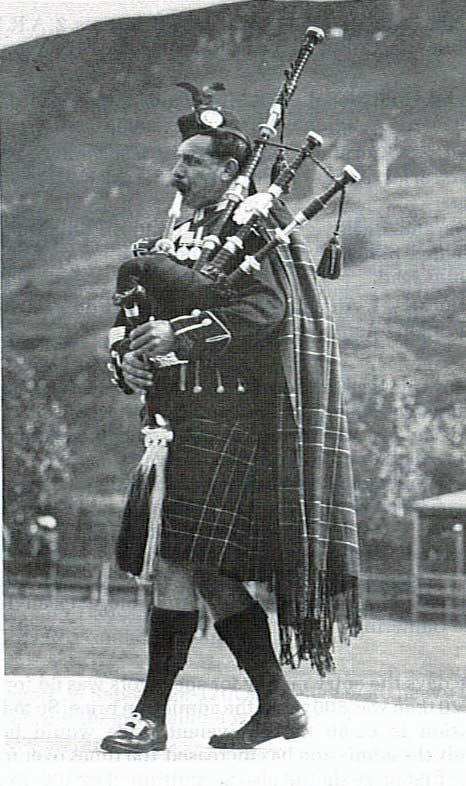
In 1919 he secured his famous post as Instructor at the Army School of Piping at Edinburgh Castle, a position at the time under the auspices of the Piobaireachd Society.*
This being only a half-time position, he was also able to accept a position as Piobaireachd Society instructor in the Highlands of Scotland, and also supplement his income with private pupils. In 1921 he was appointed Pipe-Major of the Lovat Scouts, a post he held until 1933.
By this time his competing prowess was the stuff of legend. He won the Gold Medal at Inverness in 1904 and at Oban in 1907. He won Clasps to the Inverness Medal in 1905, ’06 and ’07, 1910, ’12, ’13, ’19 and ’28 – a record of eight that would stand for decades, untouched even by piobaireachd great John MacDonald of Inverness. He won a total of 11 Former Winners’ M/S/R events at Oban and Inverness. This competitive record easily distinguishes him as the best overall competitor of his day.
A 1910 recording of Willie Ross playing Leaving Glenurquhart, Lady Loudonand Duntroon.
As his photographs show, he was a tall man and very handsome in his younger days. His wife Edith (MacGregor) was equally striking, and as Dr. William Donaldson writes in his book Pipers, “They used to turn heads in the Strand as they walked out, she dressed in the highest fashion and he resplendent in the full No. 1’s of a pipe-major in the Scots Guards.” They were married in 1903.
They had two children: a son William who died young, and a daughter Cecily, very musical, and immortalized in Roderick Campbell’s superb four-parted reel, Cecily Ross.
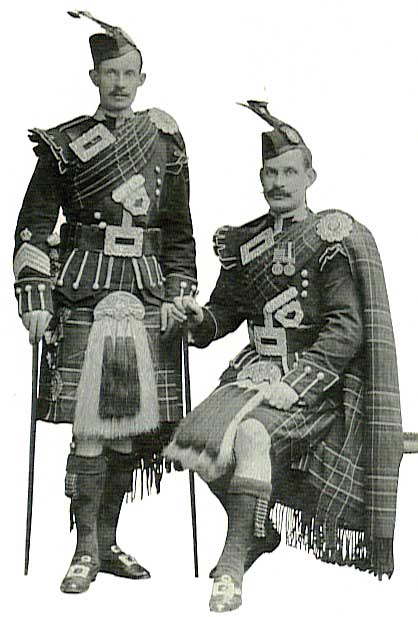
Ross would hold his position at the Castle for nearly 40 years until his retirement in 1958, when he was succeeded by Pipe-Major John A. MacLellan. During this time he transformed the position into a high-profile one, training hundreds of pipers and being responsible for virtually all the premier players the army produced at this time, including Donald MacLeod and John A. MacLellan. His most famous private pupil was John D. Burgess, who won both Gold Medals at age 16 in 1950, and with whom Ross toured North America in 1952. He produced a long series of gramophone recordings and played frequently on the radio. His fame spread. Angus MacPherson of Invershin honoured him with a piobaireachd, Salute to Pipe-Major William Ross, and he was often referred to as “The World’s Pipe-Major,” a reputation he lived up to as more than just a piper. Capt. John MacLellan wrote of him in the January 1979 issue of The International Piper:
In the words of one of his high-ranking officer friends he was peerless in conversation, a Prince of storytellers, never malicious or unkind; he loved human beings and was loved by them in return. He was gentle with all, but nonetheless a leader of men who recognized that only the best was worth attaining. He made many happy. Those who were lucky enough to be amongst his pupils always felt proud to claim it.
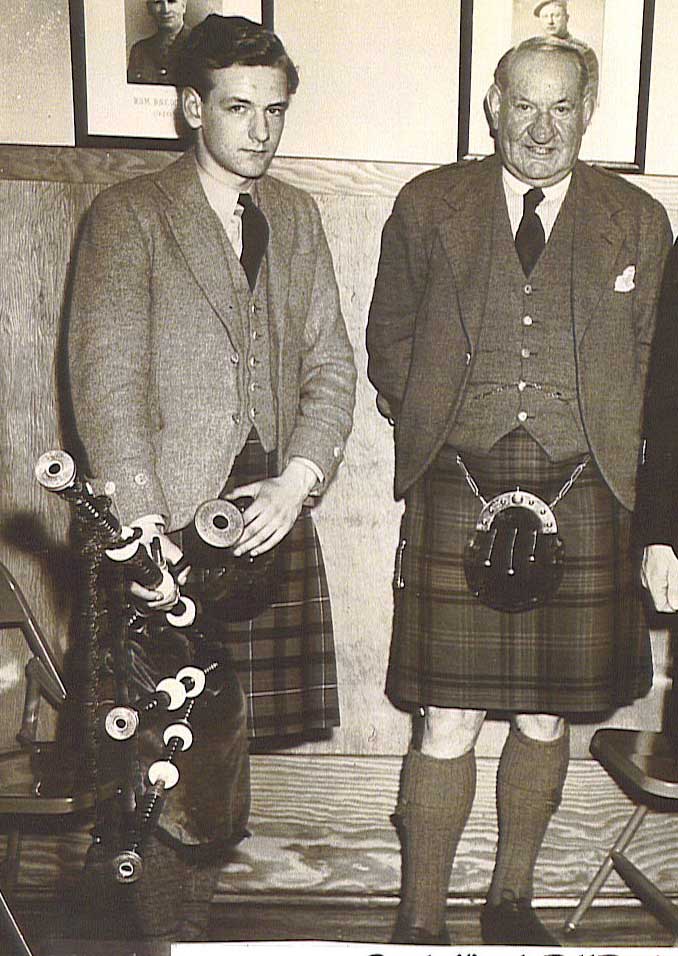
But still his influence was broader than this. His many compositions include some top-drawer tunes: the lilting 6/8 marches Leaving Port Askaig and Queen Elizabeth’s March, the haunting slow air MacRoberts’ Lament, the evergreen quick marches Corriechoillie’s 43rd Welcome to the Northern Meeting and Captain Norman Orr Ewing, the daunting and powerful competition march Brigadier General Ronald Cheape of Tiroran and the classic jig Center’s Bonnet.
He compiled five books of music between 1923 and 1950. They remain in print today and any pipers worth their salt turn first to these for competition pieces. More than any other publications, these set in firm print the gracing style evolved by the likes of John MacColl, G.S. McLennan, his cousin William McLennan and Ross himself. It is a style that is still in vogue – often gracenote-for-gracenote – on the competition platform today.
He had the distinction of being honoured by kings, as reported in the April 1966 issue of The Piper and Dancer Bulletin:
King George V awareded him the Royal Victorian Medal in 1910, and in 1945 King George VI invested him as a Member of the Order of the British Empire. While these were honours well deserved, a more distinctive one was the request from King George VI that an air composed by Pipe Major Ross and played in the hearing of the then King and Queen before it had been ‘christened,’ should be given the name ‘Queen Elizabeth.’
A 1929 recording of Willie Ross playing The Marchioness of Tullibardine, Highland Harry and Loch Carron.
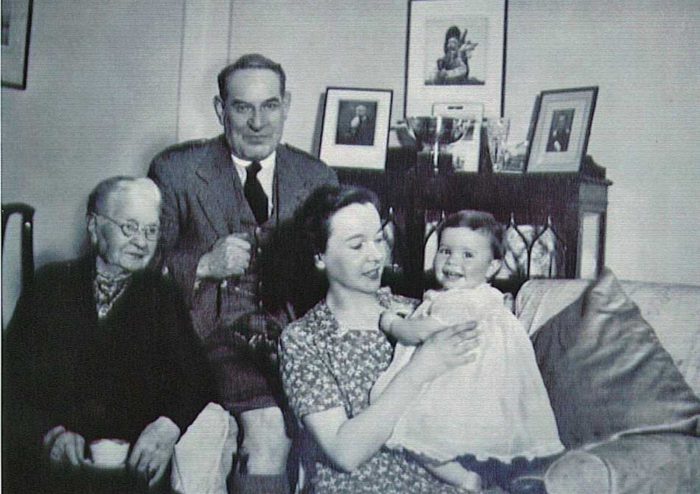
His final years were dogged by ill health. He died on March 23, 1966 in Edinburgh and was buried beside his wife in Morningside Cemetery.
At the time of this writing, efforts were being made to erect a memorial in his honour in Glenstrathfarrar.
Of Ross’s appointment to the Army School position, Dr. William Donaldson writes: Lord Lovat is a key figure behind the scenes in the Willie Ross story. Lord Lovat arranged for the Piobaireachd Society to get the income from the War Office and it was this money which enabled them to pay Willie Ross. Lord Lovat was also president of the Piobaireachd Society from 1907 until his death in 1933. Willie Ross’s father, Alexander Ross, worked for Lord Lovat from 1871, i.e. seven years before Willie was born, and was Lovat’s head keeper from 1884. Willie’s grandfather had also been a keeper for Lord Lovat, and this was the career of Willie’s older brother John.
JM, October 2006
-with notes from The Piping Times, June 1966, December 1974, March 1994,’The International Piper’, January 1979, ‘The Piper and Dancer Bulletin’, April 1966, ‘Pipers’, by Dr. William Donaldson, Birlinn Ltd., 2005, and private communication with Dr. Donaldson.

10 Comments
Just loved seeing photos of my papa & my mother & his mother –sadly I was born too late to know my great grandma Mary Collie –there is a book called Memoirs of William Collie by Bidean books which tells the story of my papas family in Glen Strathfarrar
Nice to hear from you Lesley! I’ve just sent you an email to catch up! Jim
Dear Mrs Alexander
A message for Mrs Alexander.
For some time I have had in my possession some CDVs of, I believe, your Ross family, and maybe at least two of Willie Ross, one of him as a young man festooned in medals, and the other when older. I would love to know if these photos are of your family. I can email them to you for identification but there isn’t a facility for doing so on this website. My email address should be attached to this message. I am in Aberdeen, Scotland. I came upon the CDVs quite by chance while researching another family.
Love to hear from anyone with news re my papa the late pm Willie Ross
I studied Pipe Major Willie Ross’ works as a Piping student and have some of his books.
My great grandfather Donald Campbell raised his family further west from Ardhuilc and when he died in 1912 at his daughter’s house in Helmsdale, they had his body taken to Beauly by train. Ross was on the train too and on pulling up in Beauly, he saw 5 men in full Highland dress remove their bonnets and bow their heads. That was my grandfather and 4 of his brothers. Ross did not recognise them, but on seeing the coffin leave the train, he at once took out his pipes and started playing.. The tune he chose was Corriechoillie’s farewell, which happened to be Donald’s favourite. Just prior to 1966 my father told me he had to drive an old man to Ardhuilc to have a last look at his childhood home. I was taken in the back seat as I was too young to be left in my home alone. It was years before I realised I had met Willie Ross and learned he had coached my Dad’’ s two older brothers who both died young.
That’s a fantastic story George, and thank you for sharing! In the last few years I’ve struck up a friendship — mostly online — with Willie Ross’s grandaughter, now well into her 80s. She once took me on a tour into the Great Glen right to the croft foundations where Willie was born. She spent many of her earliest years at the Castle with her mother and speaks very fondly of her ‘Papa’. JM
Late to seeing this – lovely photos to see. I was brought up with PM Ross as a constant ‘figure of importance’ in our lives as he was obviously such a massive influence on and of huge importance to my Dad.
I have had a chuckle Jim mentioned my age as Late eighties hopefully I will live long enough well past my late eighties 🤭as I have just turned 60 + UK tax of 20% I loved hearing about my papa I never knew he went up the glen to see his old home in Glen Strathfarrar bless him
Lesley, do you have an email address I contact you at?! Would love to make contact